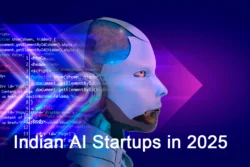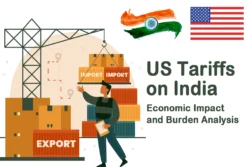India is strategically positioning itself as a global leader in Artificial Intelligence (AI) by fostering a robust ecosystem of skilled professionals to meet the escalating demand for AI expertise. The country’s vision is to harness AI’s transformative potential to drive economic growth, enhance social development, and establish itself as a hub for ethical and innovative AI solutions. Through a combination of ambitious government initiatives, comprehensive educational reforms, and strong industry-academia collaborations, India is addressing the global AI talent shortage while promoting inclusivity across urban and rural regions. Programs like the IndiaAI Mission, National Strategy for Artificial Intelligence (NSAI), and YuvAI are pivotal in building a future-ready workforce, leveraging India’s vast young population and rapidly expanding digital infrastructure.
The urgency to develop AI experts stems from the projected demand for one million AI professionals by 2026, driven by sectors such as healthcare, finance, e-commerce, and manufacturing. However, with only about 40% of the current demand for specialized AI skills being met, India faces a significant talent gap that requires immediate and sustained action. The government’s focus on establishing Centres of Research Excellence (COREs), expanding AI education in premier institutions like IITs and IISc, and introducing AI modules in schools through initiatives like Atal Tinkering Labs demonstrates a multi-pronged approach. By integrating AI into educational curricula, fostering public-private partnerships, and emphasizing ethical AI development, India aims to not only meet domestic needs but also compete globally, positioning itself as a powerhouse in the AI landscape.
Table of Contents
1. Government Initiatives to Foster AI Expertise
The Indian government has launched several ambitious programs to enhance AI research, development, and talent creation, recognizing AI’s potential to drive economic growth and social development. Below are the key initiatives:
- National Strategy for Artificial Intelligence (NSAI): Developed by NITI Aayog, this strategy outlines a comprehensive roadmap for building a vibrant AI ecosystem. Key components include:
- Centres of Research Excellence (COREs): Established at premier institutions like the Indian Institute of Science (IISc), Indian Institutes of Technology (IITs), and Indian Institutes of Information Technology (IIITs), these centers focus on core AI research with funding ranging from ₹50 crore to ₹100 crore per center.
- International Centres for Transformational Artificial Intelligence (ICTAIs): Industry-led centers for applied AI research, supported by seed funding of ₹200 crore to ₹500 crore per center for the first five years.
- National AI Fellowships: Designed to retain top Indian PhD aspirants for AI research by offering attractive incentives and challenging projects.
- National AI Marketplace (NAIM): A platform to facilitate data collection, aggregation, annotation, and deployable AI models, reducing costs and accelerating adoption.
- IndiaAI Mission: Launched with a budget of ₹10,371.92 crore (US$1.2 billion) for 2024–2029, this mission aims to develop indigenous AI capabilities. The IndiaAI FutureSkills Initiative, a key pillar, allocates ₹882.94 crore (US$100 million) to expand AI education at undergraduate, graduate, and doctoral levels.
- YuvAI Initiative: Introduced by the All India Council for Technical Education (AICTE) in October 2024, this program focuses on skilling and capacity building in open-source AI, supported by funding of up to ₹750 lakhs from Meta over three years.
- IndiaAI Data Labs: Established by the National Institute of Electronics & Information Technology (NIELIT), these labs provide foundational AI training in tier 2 and 3 cities, with 28 centers operational in 2025.
- OpenAI Academy: In partnership with the IndiaAI Mission, launched on June 5, 2025, this initiative provides AI education materials in Hindi, English, and four regional languages. It integrates with IndiaAI FutureSkills and the iGOT Karmayogi platform, aiming to train one million teachers on Generative AI (GenAI) usage.
These initiatives reflect India’s commitment to creating a skilled AI workforce, with a focus on inclusivity and accessibility across urban and rural areas.
2. Educational Reforms: Integrating AI into Schools and Universities
India’s educational institutions are undergoing significant transformations to incorporate AI into their curricula, ensuring that students are equipped with the skills needed for the AI-driven economy. The shift from STEM (Science, Technology, Engineering, Mathematics) to STEAM (adding Arts) emphasizes interdisciplinary learning, blending technical expertise with design thinking, communication, and business principles.
Higher Education
Leading institutions are at the forefront of AI education, establishing specialized schools and centers:
| Institution | Program/Center | Year Established | Funding |
|---|---|---|---|
| IIT Kanpur | Computer Science Program (including AI) | 1971 | – |
| Indian Institute of Science (IISc) | Department of Computer Science and Automation | 1969 | – |
| IIT Delhi | Yardi School of Artificial Intelligence | 2020 | $10 million (Anant Yardi) |
| IIT Bombay | Technocraft Centre for Applied Artificial Intelligence | 2021 | ₹15 crore (Technocraft Industries) |
| IIT Guwahati | Mehta Family School of Data Science and Artificial Intelligence | 2021 | – |
| IIT Madras | Wadhwani School of Data Science and AI | 2024 | ₹110 crore (Sunil Wadhwani) |
| Symbiosis International University | Symbiosis Artificial Intelligence Institute (SAII) | 2025 | – |
- AICTE’s Role: The All India Council for Technical Education has reported a 16% increase in approved B.Tech seats, reaching 14.9 lakh for the 2024–25 academic year. Over 50% of this growth is attributed to Computer Science and allied streams, including AI/ML, Data Science, Cybersecurity, Cloud Computing, and Blockchain, reflecting strong industry demand.
- IndiaAI FutureSkills Initiative: This program expands AI courses at undergraduate, graduate, and doctoral levels, offering fellowships to PhD students in the top 50 NIRF-ranked institutions.
School Education
To foster early interest in AI, schools are integrating AI education through:
- Atal Tinkering Labs: These labs, part of the Atal Innovation Mission, are introducing AI and Machine Learning modules to engage young students in hands-on learning.
- Responsible AI for Youth Program: Launched in May 2020 in partnership with Intel and the Ministry of Education, this program aims to build AI-related skills among school students, though specific course details are limited.
Skilling and Certification
- OpenAI Academy: Provides accessible AI education in multiple languages, targeting students, educators, and professionals.
- Future Skills Prime: A partnership between the Ministry of Electronics and Information Technology (MeitY) and NASSCOM, this initiative aims to reskill and upskill approximately 2 million professionals in emerging technologies, including AI.
These reforms ensure that AI education is not confined to elite institutions but is accessible across various educational levels and regions.
3. Demand for AI Experts: Current Landscape and Projections
The demand for AI professionals in India is experiencing unprecedented growth, driven by the rapid adoption of AI across sectors such as healthcare, finance, e-commerce, education, and manufacturing. Key insights include:
- Projections:
- According to the MeitY report India’s AI Revolution: A Roadmap to Viksit Bharat, India will need one million AI professionals by 2026.
- The AI market is projected to grow at a compound annual growth rate (CAGR) of 20% to reach $7.8 billion by 2025, with some estimates suggesting $28.8 billion by the same year (India Skills Report 2024 by Wheebox).
- Current Talent Gap:
- Only about 40% of the demand for agentic AI talent (specialized in Machine Learning, Deep Learning, and Generative AI) is currently met, according to industry experts.
- The talent crunch is driving up salaries, with AI experts with 2–5 years of experience commanding salaries of ₹25 lakh per annum, compared to ₹13 lakh for general AI experts and ₹8 lakh for regular developers.
- Sectoral Demand:
- Sectors like IT, banking, pharmaceuticals, telecommunications, and insurance are leading the demand for AI talent.
- E-commerce giants like Flipkart and Amazon India leverage AI for supply chain optimization and customer service, while edtech startups like Byju’s and Vedantu use AI for personalized learning.
- Startup Ecosystem:
- Over 200 AI-based startups in India are creating innovative solutions, further increasing the demand for skilled professionals.
4. Can India Meet the Growing Demand for AI Experts?
India’s ability to meet the projected demand for one million AI professionals by 2026 depends on its capacity to address current challenges while leveraging its strengths.
Strengths
- Large Talent Pool: India produces 16% of the global AI talent, making it the second-largest contributor after the USA.
- Government Support: Initiatives like the IndiaAI Mission, NSAI, and YuvAI provide structured pathways for AI education and skilling.
- Educational Infrastructure: Premier institutions like IITs and IISc, combined with the expansion of AI courses, are producing high-quality talent.
- Industry Collaboration: Partnerships with global players like Meta and OpenAI enhance AI education and research capabilities.
Challenges
- Talent Shortage: The current supply of AI experts is insufficient, with a projected shortfall of nearly one million professionals by 2027 if current trends persist.
- Skill Gaps: There is a need for advanced, industry-specific training to complement foundational AI education.
- Inclusivity: Ensuring AI education reaches tier 2 and 3 cities and diverse demographics remains a challenge.
- High Salary Expectations: The competitive job market is driving up salaries, making it difficult for some companies to attract talent.
Opportunities
- Global Leadership: India’s focus on ethical AI and data privacy, as evidenced by the Digital Personal Data Protection Act (2023), positions it as a responsible AI leader.
- Economic Impact: AI is expected to add $450–$500 billion to India’s GDP by 2025, creating new AI job opportunities.
- Startup Ecosystem: The rise of AI startups provides a fertile ground for innovation and job creation.
To bridge the talent gap, India must continue to scale its educational and skilling initiatives, foster industry-academia collaboration, and ensure that AI education is accessible across all regions. Programs like IndiaAI Data Labs and the OpenAI Academy are steps in this direction, but sustained investment and coordination will be critical.
5. Conclusion
India is making significant strides in increasing its pool of AI experts through a combination of government-led initiatives, educational reforms, and industry partnerships. The IndiaAI Mission, National Strategy for Artificial Intelligence, and programs like YuvAI and IndiaAI Data Labs are laying the foundation for a skilled AI workforce. Leading institutions like IITs and IISc are introducing specialized AI programs, while schools are fostering early interest through initiatives like Atal Tinkering Labs. However, the demand for AI professionals, projected to reach one million by 2026, outpaces the current supply, with only 40% of specialized AI talent needs met. Despite challenges like skill gaps and inclusivity, India’s large talent pool, government support, and focus on ethical AI provide a strong foundation for global competitiveness. With continued investment and strategic focus, India is well-positioned to meet the growing demand for AI experts and emerge as a global AI powerhouse.







